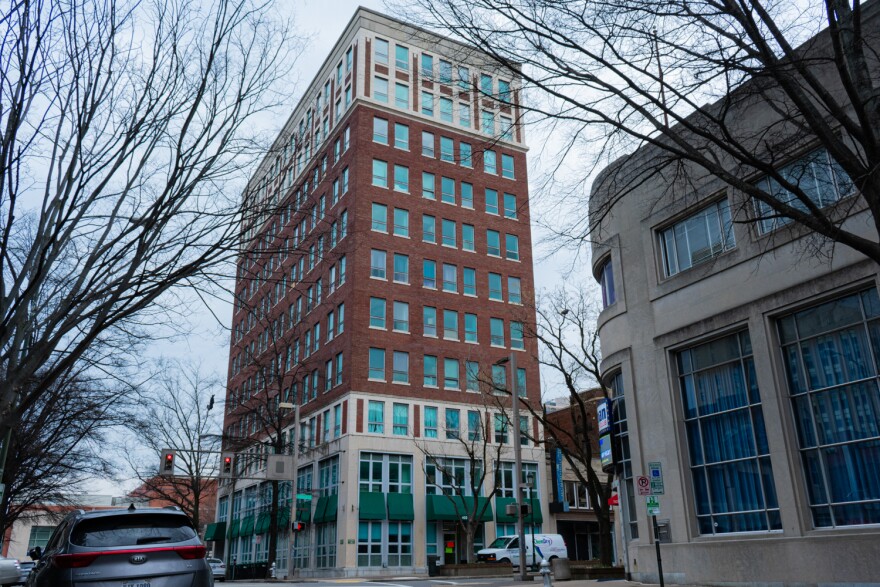Residents of Grace Place Apartments in Richmond’s Monroe Ward neighborhood were displaced from their homes in late December following a burst pipe. It’s the latest disruption for residents of the 1923 building. Originally serving as the offices for a local insurance company, the apartments opened in 2001 as income-restricted housing after being rehabilitated using federal Low-Income Housing Tax Credits.
The building was recently acquired by the Richmond Redevelopment and Housing Authority after the former owners attempted to evict residents and allegedly failed to pay owed property taxes. RRHA plans to rehabilitate the building and continue to operate it as affordable housing, though a specific funding source for the repairs has yet to be determined, according to organization spokesperson Angela Fountain.
RRHA is currently paying for residents to stay in an extended-stay hotel, and Fountain told VPM News it’s unlikely they will return anytime soon.
“Considering the conditions in the building when RRHA acquired it, and the extensive need for repairs, we do not expect residents will be able to return to the building any time in the foreseeable future,” Fountain said. “On January 4, 2023, the building was inspected by the City of Richmond’s Department of Planning and Development Review and was determined to be an Unsafe Structure.”
Fountain added that RRHA is also working with Grace Place residents to find “permanent relocation options.”
As a part of the Low-Income Housing Tax Credit program — which is administered by the IRS — Virginia Housing regularly monitored the condition of the building, conducting inspections every three years between 2003 and 2018.
Early inspections by the quasi-state agency (formerly known as the Virginia Housing Development Authority) praised the building's condition. A 2009 report said, “due to (new) management's proactive approach and attention to detail, the property's aesthetics have drastically improved. There were no adverse findings during the inspection.”
The 2015 inspection noted an issue with one of the building's elevators that was fixed within the month. But the most recent inspection in 2018 noted serious problems, including with the elevator. While building management followed up about several issues, J.D. Bondurant, Virginia Housing’s managing director of rental housing, confirmed the organization never received proof of the elevator’s repair: “I would say that was sort of the first drop in the bucket in this whole thing.”
Virginia Housing did not inspect the building in 2021. Bondurant said inspections were heavily disrupted by the COVID-19 pandemic. The IRS permitted agencies to limit property inspections during the pandemic’s early years in an effort to reduce inspectors' contact with residents.
Residents lives disrupted
Richmond fire officials inspected the building in October 2021, found 18 code sections violated and noted issues with numerous safety systems, including the sprinkler system, the alarms and the elevator. Following the inspection, the fire department forced residents to vacate the building out of safety concerns. They were allowed to return about a month later.
Between 2001 and December 2022, the building was owned by a limited partnership directed by Franklin Capital Group, an Alexandria-based real-estate investment company. Both are registered under Joseph Resende, who practiced law around Washington, D.C., before founding Franklin Capital along with John Nelson. Franklin Capital Group did not respond to a request for comment by publication time.
RRHA owned the land underneath the building during Franklin Capital’s involvement. Fountain said while RRHA owned the land, it did not monitor the condition of the building.
In April 2022, Franklin Capital Group sent eviction notices to residents at Grace Place, saying they had to leave their homes by the end of May. While the building has 58 units, many were already vacant by this time.
Martin Wegbreit, the director of litigation at Central Virginia Legal Aid Society, intervened on behalf of tenants, pointing out that the notices delivered to residents gave no reason for their eviction. That violated the agreement Franklin Capital made with Virginia Housing to acquire federal tax credits, called an extended-use agreement.
“The former owners were not allowed to evict anyone unless it was for good cause that was based on some tenant fault or something that the tenant did or failed to do,” Wegbreit said.
Franklin Capital later sent new eviction notices to tenants in August 2022 citing “business reasons” as cause for eviction — which Wegbreit called “not an acceptable legal reason.”
Wegbreit challenged the evictions of 17 out of 19 Grace Place households in court.
In response to the eviction attempts, Virginia Housing pursued action against Franklin Capital, first by debarring the holding company in September 2022, which prevented it from receiving further LIHTC funds in the state. In November, the housing agency then filed a lawsuit against the owners in Richmond Circuit Court, alleging the group violated the extended use agreement.
Franklin Capital was also facing a lawsuit filed by the city of Richmond for failing to pay the building’s property taxes. RRHA and Truist Bank were also named as defendants in the suit.
“The triple threat of those three things — my defense of the evictions, Virginia Housing’s lawsuit for specific performance and the city’s lawsuit to collect taxes — finally convinced the former owners to just give up the building,” Wegbreit said.
The city and Virginia Housing lawsuits were dropped following the sale of Grace Place to RRHA. Richmond General District Court dismissed all of the eviction cases against Wegbreit’s clients in December 2022 and January 2023. Two evictions were granted by the court against Grace Place residents whose leases had already been terminated, according to court records.
Extended-use period
The maintenance decline at Grace Place corresponded with the end of its 15-year initial compliance period.
When buildings are financed using Low-Income Housing Tax Credits, the owners agree to maintain them as low-income housing for 30 years — or longer. For Grace Place, that period ends in 2031. During the first 15 years, known as the initial compliance period, the IRS can reclaim the tax credits used to finance the project. After that, Virginia Housing continues to monitor compliance, but the credits can no longer be reclaimed.
That 2018 inspection at Grace Place, the first to note serious issues in the building, was also the first inspection after the building’s initial compliance period ended in 2016.
Marcos Segura, an attorney with the National Housing Law Project, said compliance monitoring is often weaker in the second 15 years, known as the extended-use period. He said while it’s “hard to say” how common noncompliance is in this period, “I suspect that it’s more common than we know.”
“Post the 15-year compliance period, really, the onus of enforcement or ensuring compliance is on tenants,” Segura said. “Because most tenants aren’t aware of a regulatory agreement or the fact that they’re even part of the tax audit program, you often don’t hear reports of noncompliance.”
Bondurant challenged that, saying he believed noncompliance during LIHTC properties’ extended-use periods is not a problem “en masse” in the state. He added that Virginia Housing acted quickly and decisively to counteract the noncompliance at Grace Place.
“Virginia takes this very seriously,” Bondurant said. “I don’t think you’ll find many other states suing to enforce extended-use agreements and debarring owners.”
Segura agreed with that interpretation: “What I’ve seen from my personal experience is that neither the IRS or the state agencies are particularly willing or effective at enforcement post the [initial] compliance period.”
Another element that Segura said is essential to protecting LIHTC tenants is allowing them to take legal action against building owners for noncompliance. At Grace Place, that right was included in the extended-use agreement, which Bondurant noted as another strength of Virginia’s program.
But Segura said the current structure of the LIHTC program still leaves tenants vulnerable during the extended use period.
“I just want to make sure that people know that this program is, number one, very important, very valuable to investors,” Segura said. “The focus is entirely on them. … It’s time for a change with respect to the program that focuses on tenants.”

What’s next for Grace Place?
Fountain said RRHA is planning to rehabilitate the building into “high-quality affordable housing,” though the organization has yet to identify a funding source for those repairs. The building is subject to its LIHTC extended-use agreement until 2031, but Fountain noted new funding will likely come with new requirements.
“Whether RRHA elects to use tax credits or other funding sources, affordable housing funding used for this type of building transformation would extend the affordability requirements on the property far beyond 2031,” she said.
RRHA had been in discussion about the building for at least seven months before residents were first displaced from Grace Place and 21 months before the agency purchased it. The building was briefly mentioned during a March 15, 2021, meeting of the organization’s Real Estate and Community Development Committee.
“400 Grace Street is a project that came to our attention in which it has reached the end of its tax credit compliance period,” said Desi Wynter, RRHA’s vice president of real estate and asset management, even though the building’s EUA extends to 2031. “The owner is interested in selling that development, and RRHA has a stake in that project as well due to a second funding source that we used for the project. And so, we’ll be talking with the owner regarding that transaction.”
The building was brought up again by RRHA representatives during an Oct. 19, 2021, meeting of Richmond City Council’s Land Use, Housing and Transportation Standing Committee in a list of planned RRHA projects. That meeting was held just three days before residents were displaced following the fire department’s inspection.
Fountain said RRHA’s current administration first became aware of the project on May 10, 2018.
“Subsequently, RRHA began to make plans to acquire the building following discussions with our Board of Commissioners and RRHA Executive Staff with the goal of keeping the building as an affordable housing asset in downtown Richmond,” Fountain said.
Fountain said it’s difficult to say exactly when those conversations began “because there have been several iterative discussions about this subject.”
Richmond Mayor Levar Stoney recently cited the rapidly rising cost of housing in the city as one of his top priorities during his State of the City address last week. During the speech, Stoney said his administration will work to create 2,000 new homeownership opportunities for low-income people by working with RRHA.
Fountain cited the renovation of Grace Place as another example of the housing authority’s work to reduce housing costs: “RRHA stands with Mayor Stoney and his commitment to providing affordable housing options to all Richmond families.”



